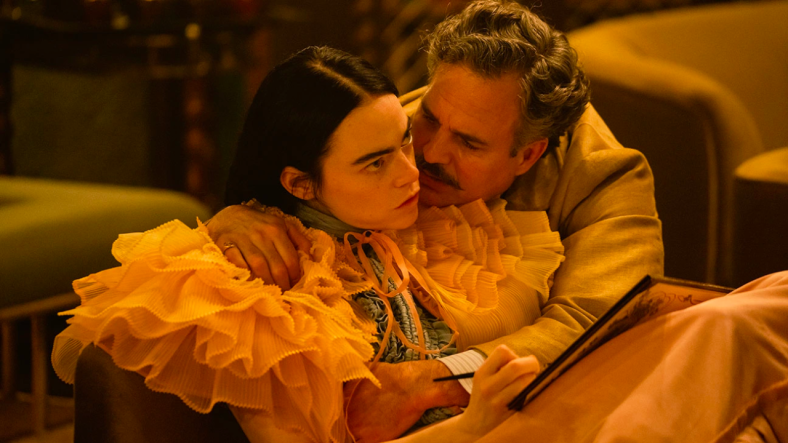‘Poor Things’ Venice Film Festival 2023 Review: A Gorgeous Mediation on Identity and Belonging

We can’t credit Yorgos Lanthimos, director of Poor Things, with coming up with the galaxy-brained take that the Victorian woman was basically a Frankenstein’s Monster of conflicting and alienating patriarchal ideologies. We can’t even credit Alisdair Gray, the famous Scottish author who penned the novel Poor Things over 30 years ago. That honor belongs to Mary Shelley, Frankenstein’s author (Mary Shelley’s Frankenstein, by the way, is about gender).
But despite the commentary being reiterated throughout the centuries since the Monster’s creation, writers and artists keep finding new ways for it to intellectually stimulate and emotionally devastate. Lanthimos’ Poor Things is an evolution of Gray’s novel, which itself was a reimagined version of Shelley’s tale. Poor Things is in the running for the Greek director’s most romantic film. He doesn’t abandon the ruthless cynicism of his previous satires of power but rather, through Gray’s text, finds an optimism that feels perfectly at home within the archetypes laid out by Shelley two hundred years ago.
Also Read: ‘Property’ Edinburgh International Film Festival 2023 Review: A Brutal Take On Home Invasion
In Victorian London (changed from the novel’s original setting of Glasgow, Scotland–a true loss), a trainee surgeon of middling competence, Max McCandles (Ramy Youssef), is invited into the secretive and bold scientific world of his professor, Godwin Baxter (Willem Dafoe). Baxter is covered with surgical scars, stitches, and malformed anatomical features, so Dafoe is of course completely at home in the character. (Plus, no other actor would be this confident with an accent that sounds like that).
Baxter is the father/creator/scientific supervisor of Bella Baxter (Emma Stone), an adult woman who, it’s revealed to Max, has had the brain of her own unborn infant transplanted into her head after an attempted suicide. Baxter, or “God” to Bella, has kept these details from his daughter her whole life, but once she’s whisked away on a debaucherous, globe-trotting adventure by cad lawyer Duncan Wedderburn (Mark Ruffalo, who wins the “Who Gets the Most Splendid Name in Poor Things?” lottery), Bella starts to see the world beyond the identities that have been projected on her by her father, her suitor, and her lover. Poor Things is an unorthodox story of becoming, as delectable and riotous as it is unnerving and stirring.
Also Read: ‘Thorns’ FrightFest 2023 Review: A Bold New Interpretation Of Hell
Emma Stone has said Bella is her favorite character she’s gotten to play, and it’s easy to see why. Bella has a complete and detailed path from curious infancy to fully realized self-actualization. There’s an initial, potentially intentional, discomfort in elements of Stone’s performance. Baxter initially lies that she’s severely disabled, but what’s more uncomfortable is how readily men like Duncan ignore her mental condition to take advantage of her adolescent sexual drive. Poor Things is about liberation from/through gender, primarily through the lens of a Victorian satire, where gothic romances provided women with the titration of thrilling, romantic escapism but refused to challenge the misogynistic conditions of their society.
As Bella leaves infancy and her hormonal explosion turns into a radical understanding of her own sexuality, the production design only gets more lavish, with colors melting together and visibly artificial building facades proudly filling up the skyline. The world of Poor Things has such an appealing and enticing texture—abnormal and uncanny, yes, but so unbound and oozing—that compliments the darkness and opportunity Bella encounters on her ever-expansive and constantly-criticized journey towards enlightenment.
Also Read: ‘Trader’ Review: A Stunning And Tense One-Woman Show
Lanthimos brings his usual zoom-ins and fish-eye lenses to play, giving a better sense of a world that’s distorted and worth leering at than in The Favourite. But the standout technical force is Jerskin Fendrix’s score. The English musician debuts his film composition talent with tremendous results. His discordant motifs and harshly plucked strings mesh with Bella’s wide, feverishly curious eyes and unbalanced footing. He even provides a sonorous chorus in the scenes demonstrating her voracious sexual appetite. When Poor Things reaches its heartfelt close, the sound of triumphant musical sentimentality is overwhelming, like it’s personally beckoning you into its deeply human oddities.
Attention to detail pushes Poor Things into greatness, overcoming a stutter in an overlong, slightly repetitive middle spell with sheer commitment to funny, outrageous, and shrewd emotional philosophy. As Baxter makes clear, the inclinations and imagination of a scientist don’t limit the scope of an experiment; they determine the results. Filmmaking is very much a similar science, one that Lanthimos uses to the fullest of its sensory and emotional range in Poor Things.
Summary
Poor Things is an unorthodox story of becoming, as delectable and riotous as it is unnerving and stirring.
Categorized:Reviews

